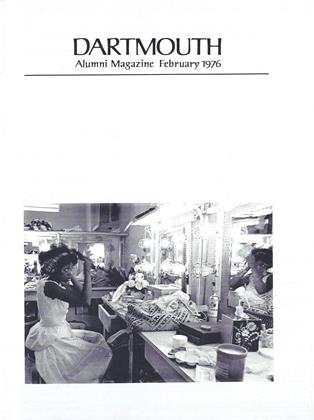In the time-honored manner of Texas, EDWARD H. HARTE '45 is a newspaperman writ large. In addition to publishing the Corpus Christi Caller-Times, he is a member of the executive committee of the Harte-Hanks chain, which incorporates 17 dailies in Texas and six other states from Washington to Massachusetts to South Carolina, other papers in California and Texas, and television stations in Florida and Texas.
Also in Texas tradition, he is a tenaciously independent man who honors and respects the same trait in others. In Lyndon Johnson country, he was an early and outspoken opponent of the Vietnam war, influenced substantially by the point of view of his eldest son, managing editor in the late '60s of the Stanford University student newspaper. In oil country, he works assiduously for controls on drilling and production. But, unlike many newspaper chains, Harte imposes no "party line" from corporate headquarters. "All the papers enjoy editorial autonomy," he stresses. "Local publishers and editors decide all matters of editorial policy."
This maverick Texan also is board chairman of the National Audubon Society, and he devotes about one week of every month to its broad conservationist programs.
Under Harte's leadership and with the urging of the Caller-Times, Corpus Christi has compiled an impressive roster of firsts in environmental protection. In 1966, he headed a committee representing industry, the public, and the city council that drew up what Harte believes to be the first city regulatory ordinance in the country, to control drilling and production of gas in Corpus Christi Bay, earlier annexed by the city. The following year the committee produced another ordinance which protected the near shoreline from any drilling whatsoever and required the clustering of all operations within a one-mile radius and the "joint-venturing" of production platforms to reduce their numbers - probably the first ordinance in the state to regulate the oil business in part on aesthetic grounds. Corpus Christi also has the first municipally operated spill association, which Harte served as original chairman. A measure of its success is the decision of the new federal Energy Resource and Development Administration to set up its first oil-spill control school this winter in the city.
"Because of the many years we have lived with off-shore oil and gas production in Corpus Christi Bay," Harte says, "I have no problem with this provided it is closely regulated and the oil companies are required to protect the environment." Although he concedes that controls would be far more difficult to enforce in open off-shore areas than within the confines of the city's 100-square-mile bay - and accidents far more destructive - Harte tends to believe that "damage can be kept to acceptable limits."
No "arch druid," Harte became active in the National Audubon Society some 12 years ago not because he was an avid birder - he claims still not to be a very good one - but because the society's middle-of-the-road approach was consistent with his own commitment to conservation. "Emotional opinions may carry the day - for a while," he says, "but to be effective in the long term conservationists have to work from facts, or at least highly educated guesses." With an active scientific affairs committee and a number of nationally known biologists on the board, "we don't pretend to have all the answers, but we do insist that the right questions get asked - and, if humanly possible, answered." While Audubon has a certain no-growth constituency among the membership and the staff, "our national policy has not gone that far; most of us assume growth whether we approve of it or not, and hope to see that it does not occur to the detriment of the environment." Nor does Harte discount the legitimacy of compromise: "Nobody ever gets things 100 per cent his way. Compromise is basic to our social organization; the jargon of our movement calls compromises 'trade-offs,' and there are nearly always some trade-offs to be made."
Harte is confident of the American public's enduring commitment to the fundamentals of clean air and clean water. He quotes recent public opinion polls which indicate that, contrary to predictions, recession has not lowered a clean and healthy environment on the public's list of priorities. He finds good evidence of an increase in corporate responsibility towards the environment - and in public pressure on recalcitrants. Those industry spokesmen who have demanded a relaxation of environmental standards on economic grounds, he believes, have been disappointed by the reaction. The surge in Audubon Society membership, doubled in the past four years to 250,000, also seems a healthy barometer of concern.
Perhaps most important, he sees young people now of college age maintaining as persistent an interest in conservation as the anti-Vietnam generation, a group he admired for their courage in fighting for unpopular principles. "I note a real commitment to leaving the world a little better than they found it, environmentally speaking."
High praise indeed from Ed Harte, who daily demonstrates just such a commitment.
 View Full Issue
View Full Issue
More From This Issue
-
 Feature
FeaturePursuing Sleep
February 1976 By B.K. THORNE, NANCY DECATO -
 Feature
Feature'Save the zebra! Save the zebra!'
February 1976 By GREGORY SCHWARZ -
 Feature
Feature'... A whole pool of frustration, anger, resentment...'
February 1976 By DAVID M. SHRIBMAN '76 -
 Feature
FeatureIce for Arťs Sake
February 1976 -
 Article
ArticleWinter Games
February 1976 -
 Class Notes
Class Notes1959
February 1976 By DOUGLAS WISE, BARRY R. BLAKE
Article
-
 Article
ArticleFORENSIC UNION
January 1915 -
 Article
ArticleNew Coach Named
February 1955 -
 Article
ArticlePOP QUIZ
Mar/Apr 2007 By ™zaa -
 Article
ArticleThe 45-Year Address
July 1949 By EDWARD K. ROBINSON '04 -
 Article
ArticleIs That Photo a Fake?
September | October 2013 By Hany Farid -
 Article
ArticleLeland Griggs, Naturalist
October 1940 By PARKER MERROW '25

